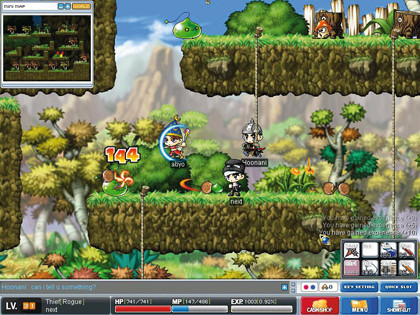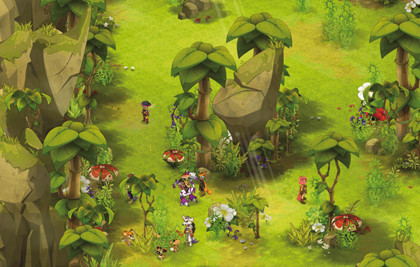Secrets of success
So why has Wurm Online succeeded where other MMO titles, who strode onto the scene wearing gigantic money hats, have failed miserably?
"One reason is no doubt cost effectiveness. We have avoided costs and overhead and focused on a small, effective team instead of borrowing money or relying on funding. Another reason is, of course, niching and not doing what others did. We also gave the players massive amounts of freedom. This has cost us speed but we have gained stability and longevity."
While Wurm, along with its vague contemporaries, such as Mortal Online and Darkfall, might fall a little short in production values, they offer worlds that aren't just about hitting monsters with a sword until you've levelled up enough to go find and hit some bigger monsters.
The players drive the game as much, if not more than, the developers do. It's reflected in the very face of their polygonal lands – the buildings on them, the warring factions and even the dizzying number of neologisms all over the in-game conversations. Low cost, high ambition – and it's paying off.
But can we expect big publishers to go in this direction? "They would have to rethink their development strategies and tools a lot first," says Jansson.
"It will be very expensive. They will want it to be browser-based, and the trouble with browser-based games is that they usually have a portion of asynchronous data access and you'd need server farms that handled the data access in pretty advanced ways. It's going to be a pain for them for a number of reasons. I also don't know if they have the people with those skills or interests as employees. If they don't do it browser-based … they will take a huge risk of having a very hard time getting the people to play it."
Sign up for breaking news, reviews, opinion, top tech deals, and more.
New players
Crucially, browser gaming means no installation, no gigantic patches and therefore no worrying about whether you have the system requirements – and that makes it attractive to people who aren't traditionally gamers, let alone MMO players.
It should and will be the goal of every MMO before too long. Including Wurm: "A goal will be to make the client run in a browser. We are going to put a lot of effort into making data access and things like settlement management accessible via browser. A lot of new features such as multi-storey buildings, castles and player-made bridges are also planned. A lot of existing features are very basic and will be polished in the process. In a few years Wurm Online will be a very accessible and polished fantasy simulator."
Now we're past hungrily demanding uber-graphics in everything, low system requirements and easy access are coming to the fore. What doesn't get reported as much as it should in lamentations about the state of the MMO industry is how fantastically successful 2D, casual-ish fare, such as Maple Story and Puzzle Pirates are.

MAPLE STORY: Casual 2D MMO success stories, such as Maple Story often get overlooked
Then there's Dofus. You've probably never heard of Dofus – and yet it has 30 million players (three million of which are paying subscribers) and just happens to be bigger than World of Warcraft in several countries. French-speaking countries, pointedly.
It is available in English, and has a fair amount of fans in the US and UK, but really it's a bit of a ghost town over here in comparison. That doesn't mean it's not a new paradigm of MMO success. It's 2D, isometric and turn-based – exactly the kind of thing that habitual gamers sneer at, in other words – it was created by just a couple of guys, and its publisher/developer Ankama has barely marketed it. It hasn't had to.
Tu Dofus? Mais oui!
Back in April, PCF wandered over to Paris to attend the annual Ankama convention. As we roamed an exhibition centre filled with over 30,000 people (of all ages, but definitely skewed towards young), all feverishly buying Dofus plushie toys, cooing at cos players (proper ones, not bearded men dressed as sailors) and queuing for sneak previews of Dofus' multiple upcoming sequel/spin-off games, we couldn't believe that we were previously unaware of this quiet colossus.
"Back in 2005 Dofus was able to gather a strong French speaking community because it was known to be a French game, and there were not too many French MMOs out there back then. The game really took off in 2008 in France," says Ankama's Cedric Gerard.

DOFUS: The quietly spoken French-made MMO giant with three million subscribers
"We've managed to continue growing for the past few years for several reasons: the game is in a style of its own: a funny, manga-looking MMO with a turn-based fighting system. The low subscription fee is also one of the factors of its success, and so is the fact that being developed with Flash, it can be played on low-specced computers."
At just £3.99 per month, it's a much easier expense to justify than the £8 to £12 we're accustomed to from flashier MMOs, which, as we know, many games have struggled to sell to the punters.
"We decided to offer a free version of the game, and give players the option to access the full version and pay for it when they are able to do so. Because of the lower fee to play, the majority of the players have been able to subscribe for several accounts, which they use to play at the same time, actually playing several characters at once, which is possible thanks to the turn-based system."
English-speaking nations are very much being targeted by upcoming sequel Wakfu, which, unlike Dofus, has a more persistent world that scrolls as you move, instead of entrances and exits on one Flash screen.
Lay your preconceptions about 2D, foreign MMOs being cheap and tawdry at the door – Wakfu is genuinely gorgeous to look at, and experimenting with a concept of a living ecosystem. Unlike sleeping giant Dofus, expect to start hearing about it soon, thanks to a Pokemon-style cross-media invasion.
"There will indeed be a very big push of Wakfu in the English-speaking markets, especially in the US", says Gerard. "We're looking to make it very successful with the elements of ecology and political system giving a lot of freedom to the players. The TV series, comic books and browser game will allow us to develop different aspects of the story."
F2P Not 4Us?
Wakfu's pricing hasn't been revealed, but it seems clear Ankama are continuing to resist the conventional wisdom that the free to play model is the future of this still-young industry:
"The free-to-play (item selling) model seems to attract a lot of companies to make casual MMOs, because it generates more revenue over a short period of time. Player lifetime is usually shorter, and the community doesn't develop in the same way and the game itself therefore usually has a shorter lifetime as well.
This type of MMO game suits a certain kind of player, those that want to spend more money in order to evolve their character quicker. Some people might think of it as the fast food of MMOs. We believe there is a danger of affecting the quality of the product in the end if revenue is the only thing you are after."
Massively.com's Shawn Schuster doesn't agree, believing that the subscription model of MMOs isn't looking terribly robust. "It won't die completely just yet, but games like Dungeons & Dragons Online are proving that people are willing to bend and try something new.
Subscription payment models are unheard of in Eastern countries, and it's just a matter of time before a hybrid model (much like DDO's) will become the norm in the Western world.
"The surprise success of Guild Wars, a game which eschewed subscriptions in favour of pure purchase price and rapid-fire expansions, was a hint of what was to come. When the sequel arrives, hopefully next year, it will emerge into a changed world. 'MMO' means nothing anymore – it's an outdated label for a very particular type of game that's slowly vanishing – or at least consolidating.
This isn't about World of Warcraft and its competitors anymore. It's about finding a place, a pace, a population and a payment plan that suits you. An industry in are after."
An industry in trouble? Far from it.